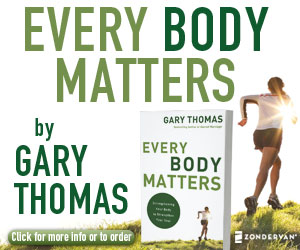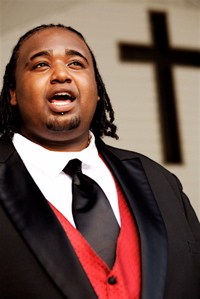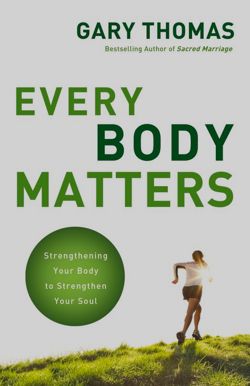
Use the new book EVERY BODY MATTERS by Gary Thomas in your church small group, Bible study, group exercise class, family devotionals or fitness ministry. Now you can make an impact in your community and improve the lives of others through faith and fitness. CONTACT US with “EVERY BODY MATTERS” in the subject line.
 Karen Yates faced a common dilemma for a young mother—what to do with the baby weight from her first two children. The situation got even more complicated as she awaited the adoption of their third child. One of the “selling points” for adoption is that a mom doesn’t have to gain weight to get a new child, but that wasn’t Karen’s experience. “It was a tough time for me spiritually, and the adoption process wasn’t easy, so there was a lot of stress, and that caused me to eat more.”
Karen Yates faced a common dilemma for a young mother—what to do with the baby weight from her first two children. The situation got even more complicated as she awaited the adoption of their third child. One of the “selling points” for adoption is that a mom doesn’t have to gain weight to get a new child, but that wasn’t Karen’s experience. “It was a tough time for me spiritually, and the adoption process wasn’t easy, so there was a lot of stress, and that caused me to eat more.”
When Karen and her husband Curtis finally got little Daniel from Ethiopia, Karen then had to deal with the shock of caring for three young children. “My world felt very small. I felt trapped in my own house. I took care of everyone but felt invisible. I knew I was loved, but as a young mother you pour everything into your very needy young children. I wasn’t taking care of myself.” Not only was she not losing the earlier “baby weight,” she was actually adding a bit more, which made her feel even worse about herself.
Karen’s “spiritual diet” wasn’t much healthier. “You could describe it the way they describe an eating disorder: binge and purge. One week I’d be in the word and pray a lot, determined to get on track with God and put him first. I got up at 5:30 even if I had been up several times during the night taking care of fussy babies.” But then, inevitably, somebody got the flu, “chaos would ensue, and the quiet times stopped for a week.”
After months of this physical and spiritual see-saw, Karen looked in the mirror and “didn’t think I looked very attractive, didn’t feel noticed, didn’t feel very beautiful with Curtis. I was no longer his girlfriend, I was his frumpy wife and the mother of his kids. It’s not that he made me feel that way; I felt that all on my own.” The worse she felt, the worse she’d do with her devotions, the less initiating she’d be toward her husband, and she even became less energetic with her kids.
The element that brought Karen out of this stupor might surprise some —it’s one that often isn’t even considered by pastors and counselors. But in Karen’s case, it proved enormously successful.
LIVING FROM THE CHIN UP
God gave us souls, and he gave us bodies to go with them. To be fully alive, fully human, fully the people God created us to be, we have to care for our bodies, discipline our bodies, use our bodies, and make them our servants in our service to God.
We need to guard against viewing the pursuit of God as a soul or mind-based search in which our bodies are irrelevant, at best, or our enemies, at worst. Though there is a long-established tradition in Christianity touting the benefits of responsible eating, there is also a tradition of those who, as one historian put it, live “from the chin up.” The only part of the body that they attend to is the intellect (doctrine); anything else is considered a lesser pursuit. Living “from the chin up” ignores the impact of our bodies on our souls.
To be mature, developing Christ-likeness in every aspect of our being, we need to address our bodies, in whatever way our current health, age, and level of fitness will allow. Swimming laps or taking Pilates won’t substitute for regular study, prayer, and spiritual devotions, but taking off the shackles of sloth, gluttony, and the physical debilitation brought about by ignoring our physical fitness can set our souls on course to pursue God with a renewed vigor, earnestness and delight.
 VOLLYBALL THERAPY
VOLLYBALL THERAPY
The thing that initially helped lift Karen out of her downward spiral was actually very physical: “I started playing volleyball again.” At first, she felt rusty and awkward on the court. It was a bit embarrassing for her, having been a fairly accomplished player earlier in life, to walk into an open gym. But she made herself do it, and the results proved dramatic.
“I noticed, after few weeks of going to the gym, being away from my kids, playing a team sport with other adults, not thinking about my duties at all, dishes, or grocery shopping—it just brought me joy. It added fun back into my life.”
The volleyball playing acted like rolling a boulder down a hill—it picked up steam for other exercise in her life. Karen noticed a little more energy, a little lighter spirit, so she started going for walks in the morning with the kids. She noticed her body getting even stronger and thought to herself, “I can walk a little farther today, a little faster, maybe even trot for a bit.” And then those trots became mini-jogs and then out and out runs. She started feeling even better about herself, and that gave her the motivation, energy, and initiative to become more disciplined about what she was eating and what she was feeding her heart spiritually.
This is so key—addressing the, not necessarily “junk food,” but certainly less than healthy food, led Karen to reconsider her spiritual food—the television programs that weren’t “scandalously bad,” but also weren’t particularly fruitful to be watching. Because of the increased exercise, Karen also started sleeping better, which meant she woke up with more energy and her mind was freer to pursue God.
What I love about this is that, as Karen tells her story, it’s clear that mind and spirit, soul and body, weren’t at war with each other—as Christians so often pit them—but working together. Just as abuse of our body can gradually numb us to Christ’s presence, so caring for our body can warm us up to his initiating grace. The new energy and confidence led Karen to address her eating habits. For some well-intentioned but misguided Christians, all “confidence” is considered inappropriate. This is a misunderstanding of humility and I believe a misreading of the Bible. Humility doesn’t mean an attitude of defeat; it’s a recognition of dependence and assured hope based on the presence of Jesus Christ. It was in large part Karen’s burgeoning confidence that led her to feel happier and more energetic as a mom, more disciplined in her spiritual devotions, and even made her “feel better sexually”—which makes perfect sense if your body is getting into shape.
Karen warns that when women discuss body issues, they often “enable each other” by “talking down women who are doing something about it.” Instead of gossiping about others, she recommends letting the physical fitness build the confidence necessary to also address other areas of life. “Most women—in fact, most people–want to be attractive to their spouse, they want to be good parents, they want to be their best. But becoming your best takes hard work and discipline. It isn’t easy.” It also takes addressing soul and body; mind and heart. We can err on either spectrum of neglect.
TRUE TRAINING
In The Republic, Plato recounts Socrates tutoring his student Glaucon: “Have you noticed how a lifelong devotion to exercise, to the exclusion of anything else, produces a certain type of mind? Just as a neglect of it produces another type? One type tends to be tough and uncivilized, the other soft and over-sensitive.”
Socrates himself was a hardy figure, a physically fit former infantry soldier in the Athenian army. He recognized that all exercise and no study creates only half a man, just as all study and no exercise also creates half a man—in this case an effeminate, soft, “overly sensitive” man who isn’t tough enough to address real life.
 It’s biblically appropriate to emphasize spiritual training in godliness above physical fitness; the Bible itself does that: “For physical training is of some value, but godliness has value for all things.” But to say that spiritual fitness is more important isn’t to say that physical fitness doesn’t matter at all, or that it has no impact on godliness and spiritual fitness. Dr. Kenneth Cooper, who popularized the word and movement “aerobics,” argues, “a healthy, fit body is the most appropriate home for a vibrant spirit.”
It’s biblically appropriate to emphasize spiritual training in godliness above physical fitness; the Bible itself does that: “For physical training is of some value, but godliness has value for all things.” But to say that spiritual fitness is more important isn’t to say that physical fitness doesn’t matter at all, or that it has no impact on godliness and spiritual fitness. Dr. Kenneth Cooper, who popularized the word and movement “aerobics,” argues, “a healthy, fit body is the most appropriate home for a vibrant spirit.”
BODY AND SPIRIT
Paul in the Bible, exalts us to be holy “in both body and spirit.” We are not souls who can neglect our physical beings; holiness requires a totality of experience that includes our bodies: “Do not let sin reign in your mortal body.” On the contrary, “Just as you used to offer the parts of your body in slavery to impurity and to ever-increasing wickedness, so now offer them in slavery to righteousness leading to holiness.”
In fact, biblical admonitions to pursue a physical holiness suggest that even our bodies should proclaim Christ’s lordship. Paul tells the Philippians that his goal is that “Christ will be exalted in my body.” This is a prayer he has for every believer: “May God himself, the God of peace, sanctify you through and through. May your whole spirit, soul and body be kept blameless at the coming of our Lord Jesus Christ.”
The sins we are to attack are not just “soul based sins,” sins of the mind, sins of the heart (lustful thoughts, envy, jealousy, hatred, prejudice), or sins of disbelief, but also bodily sins: “Dear friends, let us purify ourselves from everything that contaminates body and spirit, perfecting holiness out of reverence for God.” We are taught that each of us “should learn to control his own body in a way that is holy and honorable.” In fact, Paul’s definitive statement comes to the Corinthians: “Honor God with your body.”
The curse of today is that so many Christians equate “bodily sins” with “sexual sins.” The only possible bodily sin, in their minds, is related to lust. If they’re not sinning sexually, they believe these verses don’t apply to them. The contemporary age of the church is the only generation that has believed this.
We cannot be faithful to God if we ignore our bodies. Dr. Ed Young, senior pastor of Houston’s Second Baptist Church, and father to Ben Young insists that “Caring for our bodies is a way of honoring and loving God.” He brings both aspects together when he writes, “We cannot have total heart health if we focus only on the biological heart and ignore the spiritual. But true spirituality means accepting the stewardship of the physical heart God has given us as well.”
 SILENT SERMONS
SILENT SERMONS
I asked Karen if she had ever been challenged about these issues from the pulpit, if, perhaps, a sermon had encouraged her to consider her “volleyball therapy.” She became silent and was reluctant to speak until I pressed her. Finally, she admitted, “Look, most pastors I know are overweight themselves, so no, none of them ever preached on it.” After pausing, she added, “People want to hear how much God loves them and his grace, that they’re good enough just as they are. There’s a lot of truth in that, but the message about weight in the church is that it’s rude to say to someone that they need to lose weight so we just don’t address it.”
Sadly, this is true even though the failure to address weight issues can keep people imprisoned in unhealthy habits and a downward spiral, the kind Karen had found herself in. Talking to Karen now, capturing the joy, noticing the strength, listening to her insights, makes you wonder why we don’t want more people like her filling local churches, and why we won’t address these issues in an attitude of grace and encouragement.
Remembering her old self, Karen can recall the shame—not just with people, but with God. It was the shame, not the confidence that kept her from being “useful to the Master, prepared for every good work.” It might sound strange to prescribe volleyball for what seems like spiritual ills, but it’s difficult to argue when you talk to Karen. Here, indeed, is a woman who is having her soul refined. She hasn’t arrived yet—as none of us ever will—but she is certainly more useful to her Master, and more prepared for every good work. That’s the promise of faithful fitness: those of us who will address this personal issue in our own lives will experience considerable results. Improving your physical fitness will increase your overall zest for life. You’ll have more energy for your marriage, for parenting, for your business.
 Even above the physical, I believe being in shape means you’ll experience many benefits in your spiritual life. Like Karen, you may even notice improvement in sexual intimacy. Psychologically, the endorphins that follow a hard workout are an excellent way to manage stress and feel better about life in general. And I have had times of worship while exercising that are much richer than any I’ve known sitting in a large room singing chorus songs that some other writer has written.
Even above the physical, I believe being in shape means you’ll experience many benefits in your spiritual life. Like Karen, you may even notice improvement in sexual intimacy. Psychologically, the endorphins that follow a hard workout are an excellent way to manage stress and feel better about life in general. And I have had times of worship while exercising that are much richer than any I’ve known sitting in a large room singing chorus songs that some other writer has written.
We are not “all soul” or “all body.” God made us both, so let us be good stewards of both, to become whole people.







